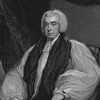 In 1781, passage of what is commonly known as the Sunday Observance Law. Discussion of the bill in the House of Commons started on May 3, 1781. Image: The Rt. Revd. Beilby Porteus, Bishop of London, printed by Fisher, Son & Co., London, 1833. Print of engraving by H. Meyer after J. Hoppner R. A.. This is a faithful photographic reproduction of an original two-dimensional work of art, and, so, is public domain, following U.S. case of Bridgeman v. Corel (1999).
In 1781, passage of what is commonly known as the Sunday Observance Law. Discussion of the bill in the House of Commons started on May 3, 1781. Image: The Rt. Revd. Beilby Porteus, Bishop of London, printed by Fisher, Son & Co., London, 1833. Print of engraving by H. Meyer after J. Hoppner R. A.. This is a faithful photographic reproduction of an original two-dimensional work of art, and, so, is public domain, following U.S. case of Bridgeman v. Corel (1999).
Passage of this Act, formally titled “Act for Preventing Certain Abuses and Profanations on the Lord’s Day, Called Sunday,” had a powerful, repressive effect on British society and culture for more than a century-and-a-half, as noted by both its proponent (Bishop Beilby Porteus) and its many Victorian critics, among them John Stuart Mill in On Liberty.
Articles
Christopher Lane, “On the Victorian Afterlife of the 1781 Sunday Observance Act”
